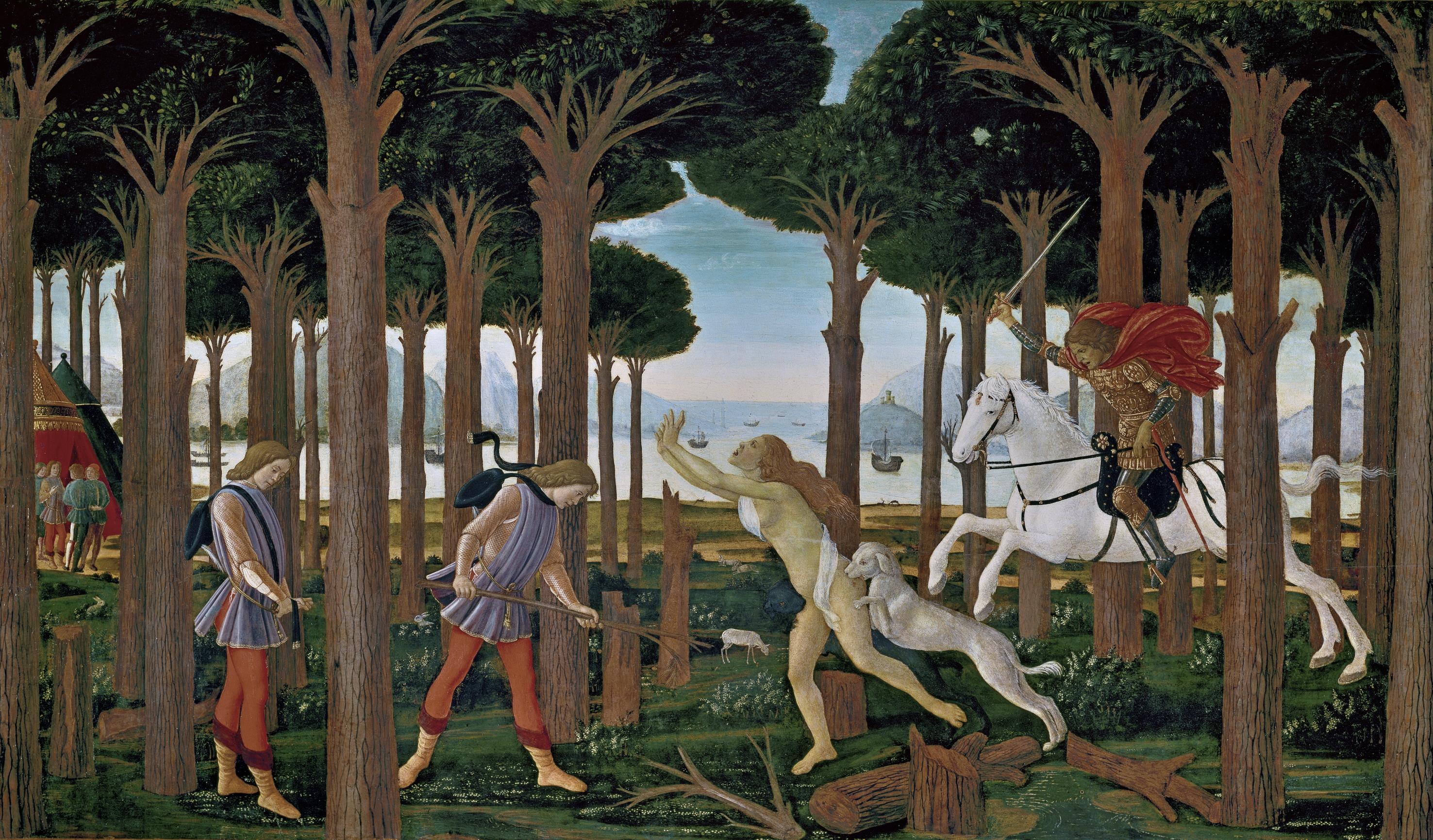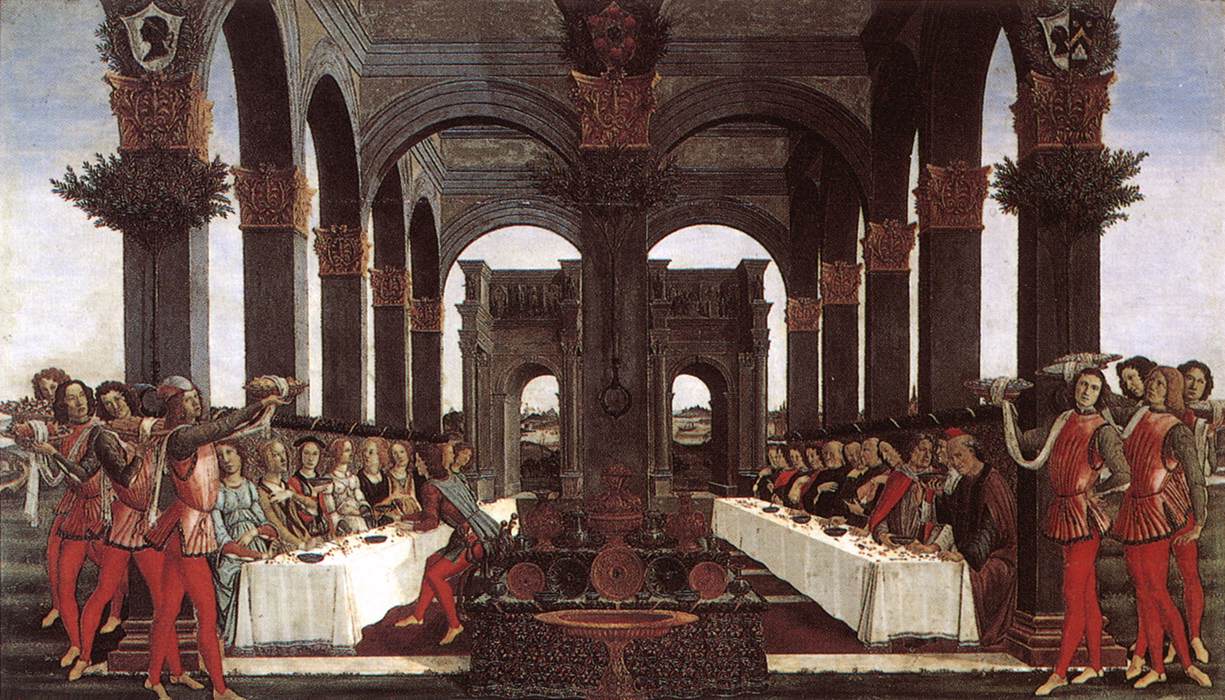Nastagio degli Onesti on:
[Wikipedia]
[Google]
[Amazon]



 Nastagio degli Onesti is the protagonist in one of the one hundred short stories contained in ''
Nastagio degli Onesti is the protagonist in one of the one hundred short stories contained in ''



 Nastagio degli Onesti is the protagonist in one of the one hundred short stories contained in ''
Nastagio degli Onesti is the protagonist in one of the one hundred short stories contained in ''The Decameron
''The Decameron'' (; it, label=Italian, Decameron or ''Decamerone'' ), subtitled ''Prince Galehaut'' (Old it, Prencipe Galeotto, links=no ) and sometimes nicknamed ''l'Umana commedia'' ("the Human comedy", as it was Boccaccio that dubbed Dan ...
'' by Giovanni Boccaccio
Giovanni Boccaccio (, , ; 16 June 1313 – 21 December 1375) was an Italian writer, poet, correspondent of Petrarch, and an important Renaissance humanist. Born in the town of Certaldo, he became so well known as a writer that he was somet ...
. The eighth story of the fifth day, it tells of the unrequited love of the nobleman Nastagio for a girl who will eventually be induced to accept Nastagio's affection by the appearance of a rejected lover and her beloved.
Plot
Nastagio degli Onesti is a noble inRavenna
Ravenna ( , , also ; rgn, Ravèna) is the capital city of the Province of Ravenna, in the Emilia-Romagna region of Northern Italy. It was the capital city of the Western Roman Empire from 408 until its collapse in 476. It then served as the cap ...
, made rich after the death of his father and uncle. He falls in love with a girl of a noble family, the daughter of Paul Traversari The Traversari (or ''domus Traversariorum'', according to medieval chroniclers) are a noble Italian family. The dynasty's history was mostly connected to Ravenna, which it ruled between the 12th and 13th centuries. St. Romuald was the son of Duke ...
. To get her attention, Nastagio begins to squander his money on banquets and parties organized only for her (a reference to the economy that links this story to that of ); The girl, however, does not return the love of Nastagio; indeed she takes pleasure in refusing it. Nastagio tries to forget the noble girl. Failing this he starts to hate her. This drives him to attempt suicide several times with no success.
Seeing Nastagio's despair, his friends and relatives advise him to go to Ravenna, in order to forget his unfulfilled love. The young man, unable to continue ignoring this advice, moves to Classe, not far from his hometown.
One Friday in early May, Nastagio walks through a pine forest at dusk, where he sees a girl running naked in tears, being chased by two dogs trying to bite her and a Knight
A knight is a person granted an honorary title of knighthood by a head of state (including the Pope) or representative for service to the monarch, the church or the country, especially in a military capacity. Knighthood finds origins in the Gr ...
with a black sword intending to kill her. Nastagio tries to defend her, but the knight presents himself as Guido of Anastagi and tells of how he had once loved this woman, but because she did not love him, he had himself committed suicide. When the girl died without any regrets for the misery she had inflicted on her admirer, she was sentenced to the cruel punishment of being hunted. Every Friday, the girl would have to undergo the killing and subsequent restoration of their bodies for as many years as it had been months that she had rejected her wooer.
Nastagio understands the events to be of divine will and resigns himself to being an onlooker. He witnesses the agony inflicted on the young girl by the rider, after which the two are forced to start the chase again and disappear from Nastagio's sight. The young man decides to take advantage of the situation and prepares a lavish banquet in the same place of the forest on the following Friday, inviting the relatives of his beloved together with his parents. As Nastagio predicted, at the end of the dinner the horrifying scene is repeated with the same harrowing and pitiful consequences. With this he gets the desired effect: after the hunter once again explains the reasons for the girl's fate to all of those present at the dinner, the girl loved by Nastagio realizes she had stepped on the love felt by Nastagio and, for fear of suffering the same fate of the victim before her, she changes her mind and immediately agrees to the marriage, transforming his hate into love. So the Sunday after they marry, and all the women of Ravenna learn to be more kind to their love.
Art
Sandro Botticelli
Alessandro di Mariano di Vanni Filipepi ( – May 17, 1510), known as Sandro Botticelli (, ), was an Italian Renaissance painting, Italian painter of the Early Renaissance. Botticelli's posthumous reputation suffered until the late 19th cent ...
made a series of four panels that illustrate many episodes of the story Boccaccio, thought to have been commissioned by Lorenzo the Magnificent
Lorenzo di Piero de' Medici (; 1 January 1449 – 8 April 1492) was an Italian statesman, banker, ''de facto'' ruler of the Florentine Republic and the most powerful and enthusiastic patron of Renaissance culture in Italy. Also known as Lorenzo ...
in 1483 as a gift to Giannozzo Pucci Pucci may refer to:
*Members of the Pucci family, a major Florentine political family
** Antonio di Puccio Pucci (c. 1350–1416), Florentine politician and architect
**Puccio Pucci (politician) (1389–1449), Florentine politician, son of Antonio
...
at his marriage to Lucrezia Bini of that year. Originally stored in Palazzo Pucci, Florence, in the second half of the nineteenth century they were dispersed: three are now in the Prado, and only one, the last, has returned to its original location after being, among other things, in the Collection Watney of Charlbury
Charlbury () is a town and civil parish in the Evenlode
Evenlode is a village and civil parish ( ONS Code 23UC051) in the Cotswold District of eastern Gloucestershire in England.
Evenlode is bordered by the Gloucestershire parishes of More ...
at London
London is the capital and largest city of England and the United Kingdom, with a population of just under 9 million. It stands on the River Thames in south-east England at the head of a estuary down to the North Sea, and has been a majo ...
.
Style and interpretations
Two characters of the novel, the black knight and the woman on the run, are damned in hell. There has been no sign of repentance for their sins, and that is suicide for him and the refusal of love for her. By Boccaccio, then, love, even in its componenthedonistic
Hedonism refers to a family of theories, all of which have in common that pleasure plays a central role in them. ''Psychological'' or ''motivational hedonism'' claims that human behavior is determined by desires to increase pleasure and to decre ...
, receives a positive evaluation: everyone has the right to love and be loved in return, so the woman was guilty for not having loved.
Even the scene of the "infernal hunt", already present in Divine Comedy
The ''Divine Comedy'' ( it, Divina Commedia ) is an Italian narrative poem by Dante Alighieri, begun 1308 and completed in around 1321, shortly before the author's death. It is widely considered the pre-eminent work in Italian literature and ...
, the singing
Singing is the act of creating musical sounds with the voice. A person who sings is called a singer, artist or vocalist (in jazz and/or popular music). Singers perform music (arias, recitatives, songs, etc.) that can be sung with or without ...
of Pietro della Vigna
Pietro della Vigna (also Pier delle Vigne, Petrus de Vineas or de Vineis; Capua, ca. 1190 – Pisa, 1249) was an Italian jurist and diplomat, who acted as chancellor and secretary (logothete) to Emperor Frederick II. Falsely accused of ''lèse-ma ...
, is inserted by Boccaccio in a setting very different from natural to Dante
Dante Alighieri (; – 14 September 1321), probably baptized Durante di Alighiero degli Alighieri and often referred to as Dante (, ), was an Italian poet, writer and philosopher. His ''Divine Comedy'', originally called (modern Italian: '' ...
, a '' locus amoenus '' in which assumes traits much less gruesome and more like those of a sacred representation.
In the novel appear many words belonging to the language of courtly love. The lady is arrogant, disdainful, and haughty, though in this case, these negative qualities are in the very structure of the story, as it will give women an example of how they should not behave. Eventually the lady is promoted for her sincere love, not for fear of punishment which would have incurred, and in the end she falls for Nastagio.
References
{{reflist Characters in The Decameron Literary characters